#which is WHY I included the point about context
Explore tagged Tumblr posts
Text
This reminds me of a video I watched by Rachel Oates, called 'How much does intent matter in Art?' that covers this nicely. She discusses a theory I learned about in Media studies called 'the medium is the message', by Marshall McLuhan, which, suggests, to put simply, that art or media (including books) are encoded with messages, and views, even if you don't realise it, and when the audience consumes them, they decode it, and perceive it. While she doesn't mention SJM or her books, applying the theory to poetry to try and educate people about intention and outcome in art.
Rachel basically explains (better than me, since I'll keep it short for brevity) that if an artist, of any kind, hones and utilises the techniques and skills that come with their craft well, then the audience perceives the message as intended. However, if they utilise their techniques poorly, then the audience will intemperate a different message.
You can still like it, enjoy it, or say you personally think it's really good, because art is inherently subjective, but searching for techniques and their utilisation in art is how a critique critiques them. It's why critique review and audience review of movies and tv shows differ. A critique rates it based on cinematography, writing, directing, and a other factors that may very depending on if it's a tv show, live action animation, etc. Meanwhile audiences rate it on entertainment, relatability, and how impactful it is, etc.
Of course, objective critiques can be argued, with evidence. One person could take a quote from any of the ACOTAR books and use it to argue why ACOTAR is a feminist story, while someone else could take a different, or even the same quote, and argue otherwise, with the artist's intention becoming irrelevant.
Rachel, also explains, art needs to be able to stand on it's own, without needing background about the artist or other context, for it to have meaning or to affect people, to which I agree. Especially in this context.
Take the hike scene. SJM intended it for it to be therapeutic, and healing for Nesta, while others, myself included, argue that it was poorly written at best, and example of abuse at worst. Often, people use SJM's real life hike to argue this point. However, if that context is needed for the scene to stand, then it was't well executed. At best it show's SJM's lack of skill, and usage of structure, plot and techniques, with a lack of true understanding of depression, and the state of mind people are in when they consider taking their own life, and at worst, it shows a very dangerous mindset surrounding the aforementioned subjects.
The point Rachel ultimately makes, is that intention doesn't matter if art, including literature, is offensive, or harmful.
If SJM failed to send the feminist message her books were advertised for having, then her intent doesn't amount to much. If someone is offended by your art, or criticises it for the way it handles certain subject matter, then that reflects a lack of skill on the author's part, at best. At worst, it reflects dangerous ideals and mindsets.
It's also important to understand that many people have different upbringings, and life experiences, which is another reason that there are such different interpretations of art. Every character in her books have said or done things worthy of criticism, some more than others. SJM has said, done and written things that need to be criticised, her handling of race, colonisation and slavery, to name a couple, outside of just how she botched feminism and abuse.
There are victims who relate to Feyre, Mor, Rhys, etc. There are victims who relate more to Nesta, Tamlin, Eris, etc. There are victims who condemn SJM's books and characters in their entirety. There are people, who aren't victims, that relate to Azriel, Emerie, Elain, tc. There are people, who aren't victims, that relate to Viviane, Tarquin, Gwyn, etc. There are people, who aren't victims, that condemn SJM and her writing in their entirety.
However, if SJM is called out for offending people, be it marginalised communities, women in general, or victims, then it's worth apologising, reevaluating why and trying to improve her craft to prevent doing so again. Also, editors and sensitivity readers wouldn't go amis, especially in stories that try to use themes of slavery, racial and gendered discrimination.
To wrap this up, SJM's intent doesn't matter. If people are offended, she needs to take accountability, apologise, and try to do better next time. Given her consistent failure to use incorporate race and slavery into her books in a way that handles the topics with the respect they deserve, I'd say she's failed on all three fronts there. In fact, it become clear that racial and queer representation are half-assed just to give her plausible deniability. If people like it, she can take the credit, if not she can deny it.
Ultimately, art is subjective. Just because she receives criticism, doesn't mean you have to hate it. You're free to have your opinions, but don't be rude, cruel, or otherwise bully others for theirs.
If you're going to try have a discussion with me about these books then I need you to bare in mind that I base absolutely none of my opinions or analyses on SJMs intentions
I have 0 faith that that woman even recognizes the absolutely horrid things she has written nevermind that she intends to actually go into much depth with any of it (Rhysand's abuse, the IC dynamics, the terrible ruling system, retcon retcon retcon for days, the Illyrians, Nesta etc). And people can say that's misogynistic if they want, I do not care. She has shown absolutely no evidence that she doesn't have her head completely encased by the Inner Circles asses or that that and her inability to self insert hasn't completely skewed the way she writes this series so sue me. I don't even believe she fully understands the characters she has written, it's as if she has written so much retconning and gaslighting behaviour in this story that she's somehow managed to gaslight herself at this stage
So anyway my opinions and my interpretations of the characters are based on their actions in the text not what SJM intended for them to convey or whatever bullshit she has the IC spout and if that's what you like to follow that's fine but go be a sheep somewhere else because I won't engage with it I'm sorry (not really)
#pro nesta#nesta archeron#anti cassian#anti nessian#anti rhysand#anti acosf#anti inner circle#sjm critical#acotar critical
91 notes
·
View notes
Note
Since this has come up again I gotta say I disagree with you about the use of the word. I think it’s bizarre to call it a slur that is extremely offensive to use and then also say it’s been “defanged” in the same breath. I also think it’s strange that I’m sure I have seen you reblogging posts about why people ID with slurs but then you also say that use of slurs is just “edgy” and “white noise”.
I assume you’re not really interested in a good faith discussion about it but the gist of it in my opinion is as follows.
1. Many people have had these slurs weaponised against them and using them in a casual context or self-identifying with them allows them to reclaim them in a positive way and take away the power of them. I.e. this isn’t a scary word because it was shouted out a car window at me or used by the person who assaulted me. I am not scared of this word. This word is who I am and I am okay with that.
2. Some people find that words commonly used as slurs feel more true to their experience than the polite, socially acceptable versions of the words. This can be for a variety of reasons but one I’ve commonly seen is that they feel as though the softer word is shying away from how they identify rather than facing it head on.
3. It can be a way to make people pay attention and get your point across. This can be wielded politically like in protests or pride parades or in pseudo political protests like online calls to action. As in, “the people who hate me call me a [slur]; well, this [slur] has something to say”.
4. Some people feel rubbed the wrong way by rainbow marketing (I.e. big corporations putting rainbows on things in June and talking about how inclusive they are while not actually doing anything meaningful to support the community and sometimes actively working against them in other ways, purely in the interest of getting the gay dollar) and like to self identify with words that squeaky clean corporations are never going to sell back to them.
This is not an exhaustive list, but it covers a few of the common reasons that I have seen. And it’s certainly not just the f word for gay men that gets used this way. Consider Alison Bechdel’s Dykes To Watch Out For, a piece of lgbt pop culture so entrenched that the term “the Bechdel test” is commonly used in media criticism. It certainly wouldn’t have been improved, in my opinion, by being named “Lesbians to Watch Out For”.
I think I was pretty clear that a word can be defanged in one context and remain a harmful slur in the other. The crux of my issue with using that word is that I do not know how it is being used when a stranger says it to me. As I have mentioned before, I live with two gay men, one of whom does use that word, and when he does it I am comfortable with it because I know him and I know the context in which it is being invoked.
I do not know that context online and I am not going to assume a stranger on the internet is a safe community member just because "tumblr is the gay website." First of all, it isn't, and I don't make a habit of assuming strangers' sexual orientations without strong contextual reasons to do so (e.g. gay bars, and even there it's not a guarantee). Secondly, people can be members of the community and still use slurs inappropriately.
I do not feel that everyone who is using slurs on tumblr is reclaiming them in any meaningful way. It looks much more like this is the cool new word, like a bunch of second-graders who just heard the word fuck for the first time. This is why I talked about it being defanged. My reference to white noise was because the word "gay" has been overused so much on this website (e.g. "gay little [x]") that it barely means anything anymore. It's practically a filler word. The alternative used to be "queer," but now that's been overused and sanitized because it was adopted by the mainstream and corporations found it. People picked up on "fruity" for whatever reason, probably because it's a bit old-fashioned and not used much by serious homophobes anymore, and also just sounds kind of funny. And that was quickly overused, the way memes are run into the ground.
But here's the thing: there is no word that is safe from rainbow marketing. There isn't. Maybe they would never use f*ggot now. Give it time. If you want to outrun mainstream society, you will always be hopping to a different word. Especially with the internet. People become desensitized very quickly to memetic language, simply due to saturation.
Tumblr users did not reclaim f*ggot. They turned it into a meme. They did the same thing with the limp wrist. And yes, gay people do these things with each other. In private. In gay spaces. Not on the public internet. Even if tumblr were a gay website (it's not) content from this site ends up on twitter, instagram, tiktok, and facebook. I do believe the use of slurs on this website is edgy. I won't speak for individuals, but as a trend it is at least partially motivated by being cool and getting clout. My point in saying it had been defanged was it was no longer accomplishing its purported goal of reclamation. Some of the reasons you listed for using slurs--facing things head-on etc.--rely on shock factor, and therefore have a naturally limited lifespan. People still say "queer as in fuck you," but when queer is the standard academic term and has been adopted by mainstream institutions, does it really hit the same way?
Each slur has its own history. I'm a fan of Dykes to Watch Out For. I attended a Dyke March last year. I am personally uncomfortable with f*ggot because unlike other slurs, I have personally experienced this one being used by homophobes. I think it was fairly popular in the United States in the 2000s, so many people have this experience, and therefore it is still more strongly associated with homophobia. This is still true outside tumblr, regardless of the defanging I observed here.
I am concerned about the eagerness of some to use slurs and engage in "ironic" homophobia (e.g. limp wrist) at a time when many countries are facing such a serious homophobic and transphobic backlash. I am concerned about slurs for the LGBT+ community in particular, because the idea of "who can reclaim them" is more fluid than with racial slurs and many other slurs. Someone can be raised in a homophobic environment and be a homophobe who calls people f*ggots, then come out as gay themselves and continue calling people f*aggots but it's "okay" now, whether or not they ever had any self-reflection about it. I am not accusing specific people of following this exact path, but this pattern is responsible for a lot of internalized and intracommunity homophobia.
I do believe that reclaimation is a conscious, active process. A lot of talk about reclaiming words on tumblr sounds like Michael Scott declaring bankruptcy: I didn't say it, I declared it.
I hope I've explained my opinion a little bit here. Contrary to your assumptions, I am interested in a good faith discussion. The person who asked if they could call me a f*ggot was not.
#i did anticipate people claiming i was being contradictory before#which is WHY I included the point about context
13 notes
·
View notes
Note
Hermione and Ron’s difference of opinion about the significance of heiress and heir is SENDING ME. That’s exactly how it would be. Thank you ever so much for introducing us to Lucia Darcy Malfoy, First of Her Name, Queen of Daddy Issues and Most Assuredly That Bitch.
"Is Malfoy(15f) Hot?" - the greatest thread in the history of gryffindor tower, locked by a prefect after 12239 hours of heated debate,
#greenteacup asks#I actually love this character more and more as I think about her#an utterly radicalizing presence in the castle. her existence would do horrendous things to the feminism discourse at hogwarts#ron would call her a bitch once and hermione would go on a 2-hour rant about why using that word is anti-woman#including several excellent points about the animalistic historical context and the implicit derision of gendered insults#she ropes in harry AND the twins. there are visual aids involved#the conclusion being that harry and ron are careful to use Hermione-Approved insults like 'fucker' and 'dickhead'#and provisional greenlights for edge cases like 'twat' and 'cow' pending granger veto#all of which is eventually related to darcy years later when she and hermione start hanging out on prefect patrol or something#and darcy is. baffled. being that she once called a mandrake a bitch because it “looked at her wrong”
19 notes
·
View notes
Note
Have been rewatching House md, stumbled upon the episode where there was a woman who couldn't fall asleep, no matter what she did.
So I thought, imagine if you couldn't fall asleep. But couldn't die either. The exhaustion, the trembling, hallucinations, nausea, headache, emotional exhaustion as well, absolutely torturous. All the pack, but you are not capable of dying, you live in this state for days. For months. For years. Forever.
This is the horror I was thinking about when I decided my Spamton had little to no needs or feelings as a puppet because it adds to the mess you mentioned above by the virtue Spamton longed for that.
There was no pain of agony for Spamton, maybe the memories of such but nothing that ever came close after that. He could not shiver or tremble, there was no exhaustion or sleep-deprived hallucinations. There was no physical longing for rest. The only thing there was, was nothing. For days there was nothing, for months there was nothing, for years there was nothing. No feeling of wind on his porcelain skin, no eyelids to get heavy less a mechanism was acting up, nothing. Not even the comforting in pretending he needed rest, closing his eyes to darkness, more nothing no light permeating his now solid eyelids, no phosphenes, just solid nothing.
It says something that Spamton would find her experience a more preferable fate... at least for a long while.
#chapter 11 is gonna sort delve into this with Spam and Banner amougst other things#but 10 is for softer things#but yeah this is the sort of horror my spam went through#he wouldve prefered agony to the lack of feeling he had for over 20 years#it took a toll on his mind cause at some point forgetting that type of stuff has to do something to you#he couldnt even cry about it just sit and think and be miserable that he could not feel#and long to be able too again#utdr#spamton#ask#deltarune#spamton g spamton#anon#CDAP au#spam effectively got the worst type of immortality in my au#the type that sees that you stay alive but you arent living#which also sucks doubly as I hc darkeners don't age or die in any traditional sense so not only would he be immortal in the prev context#but he has to watch everyone including his old friends and relationships LIVE like he cant feel and experience like he cant#my reasoning on why hes so messed up and bitter as a puppet other than the whole puppet thing itself
7 notes
·
View notes
Text

#you know why it's got the label#I'm sorry but the infamous pony jar will never leave me#aw hell I forgot the layer w/ subs which was the whole point at first lmao#worst line of dialogue they could've included in this context about a decade prior to it being relevant lads
5 notes
·
View notes
Text
I'm a big fan of wizards-as-programmers, but I think it's so much better when you lean into programming tropes.
A spell the wizard uses to light the group's campfire has an error somewhere in its depths, and sometimes it doesn't work at all. The wizard spends a lot of his time trying to track down the exact conditions that cause the failure.
The wizard is attempting to create a new spell that marries two older spells together, but while they were both written within the context of Zephyrus the Starweaver's foundational work, they each used a slightly different version, and untangling the collisions make a short project take months of work.
The wizard has grown too comfortable reusing old spells, and in particular, his teleportation spell keeps finding its components rearranged and remixed, its parts copied into a dozen different places in the spellbook. This is overall not actually a problem per se, but the party's rogue grows a bit concerned when the wizard's "drying spell" seems to just be a special case of teleportation where you teleport five feet to the left and leave the wetness behind.
A wizard is constantly fiddling with his spells, making minor tweaks and changes, getting them easier to cast, with better effects, adding bells and whistles. The "shelter for the night" spell includes a tea kettle that brings itself to a boil at dawn, which the wizard is inordinately pleased with. He reports on efficiency improvements to the indifference of anyone listening.
A different wizard immediately forgets all details of his spells after he's written them. He could not begin to tell you how any of it works, at least not without sitting down for a few hours or days to figure out how he set things up. The point is that it works, and once it does, the wizard can safely stop thinking about it.
Wizards enjoy each other's company, but you must be circumspect about spellwork. Having another wizard look through your spellbook makes you aware of every minor flaw, and you might not be able to answer questions about why a spell was written in a certain way, if you remember at all.
Wizards all have their own preferences as far as which scripts they write in, the formatting of their spellbook, its dimensions and material quality, and of course which famous wizards they've taken the most foundational knowledge from. The enlightened view is that all approaches have their strengths and weaknesses, but this has never stopped anyone from getting into a protracted argument.
Sometimes a wizard will sit down with an ancient tome attempting to find answers to a complicated problem, and finally find someone from across time who was trying to do the same thing, only for the final note to be "nevermind, fixed it".
36K notes
·
View notes
Text
I've been thinking about Laios' succubus lately. Mulling it over a bit.
Because I've seen these pages brought up a fair bit, but almost entirely in the context of shipping (on all sides, really). And I really want to understand what they are doing for the story beyond that.
When I went back to reread the scene and section, a few things caught my interest: the way Laios responds to both forms of his succubus, the themes of the volume the chapter is found in, and the other events of the chapter itself.
So let's dive into those three things, and what I think they say about the succubus scene's purpose.
Laios is never fully frozen by the succubus
So. If you compare Marcille and Chilchuck's reactions...
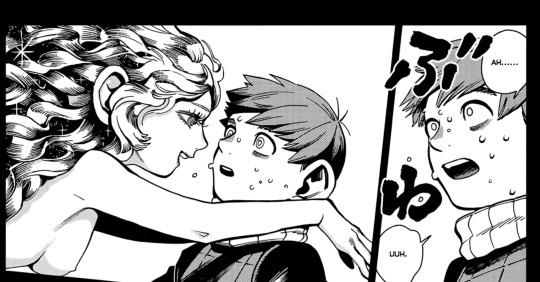
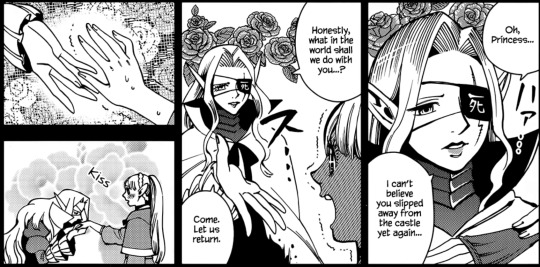
to Laios':

-
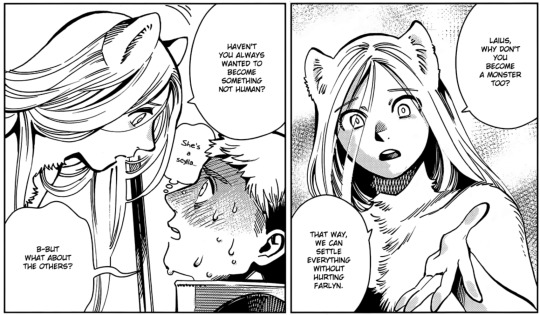
There is a difference. Sure, the basics may look the same once it turns into Scylla Marcille, but even then, it functions differently.
Chilchuck and Marcille are completely frozen once they catch sight of their succubus. Izutsumi, as well, isn't able to look away, and completely freezes up once her 'mom' starts talking to her. As Chilchuck describes, "just looking at them makes you unable to move."
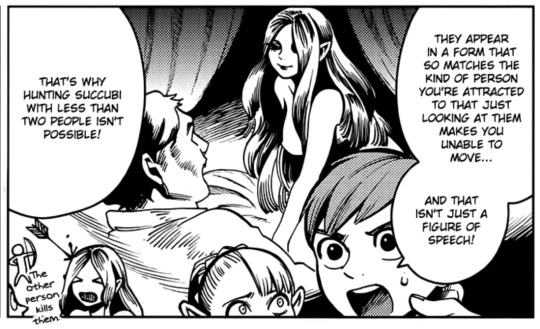
And yet, Scylla Marcille has to actively convince Laios to comply. He even looks away from her at one point!
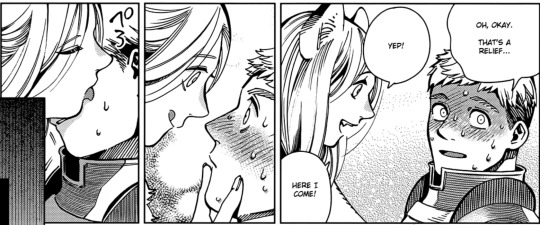
Laios accepts this succubus, but he is never actually helpless to it in the same way. Taken in? Convinced? Sure, at least enough to let things happen that he probably should question more than he does. But magically compelled? Not really. Not the same way as everyone else is. So that's interesting. But let's move on for now.
2. Volume 9 is all about drive and desire
I don't often look at chapters within the context of the volume they are included in, but I think there's some really fun things to be found with that perspective in mind.
For one, volume 9 starts with an exploration of what desire brought Laios to the dungeon:
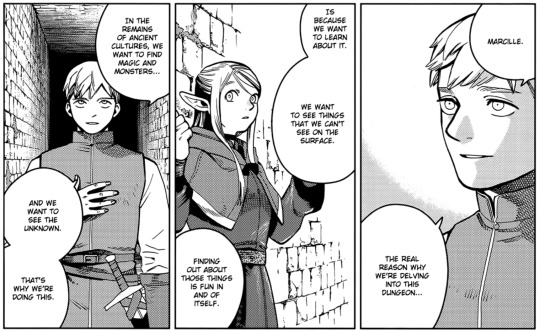
And ends with a question of what desire brought Laios to the dungeon:
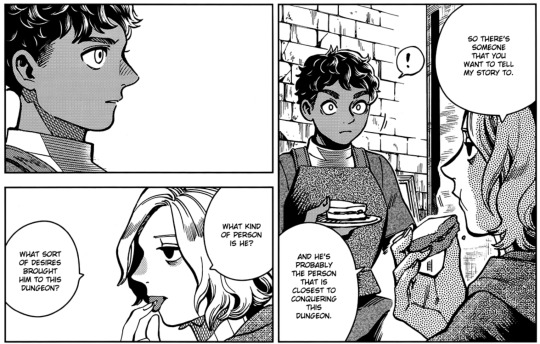
It's also very concerned in general with questions of why people do what they do. Why they are in the dungeon, why they are with the people they are with, why they stay, what they fight for.
In addition to Laios, we see it with Marcille...
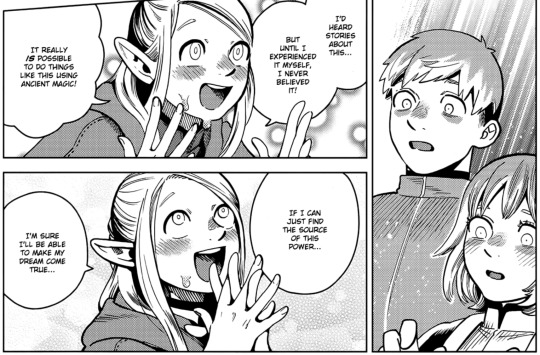
Izutsumi
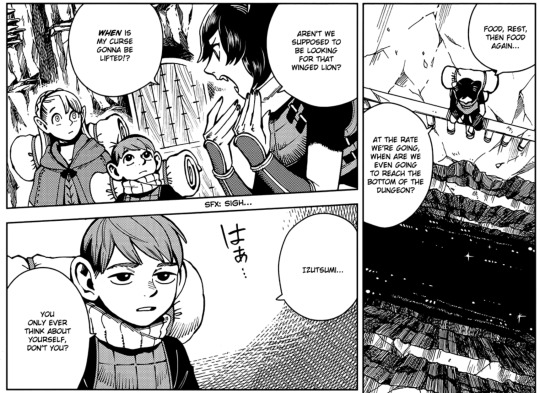
Kabru
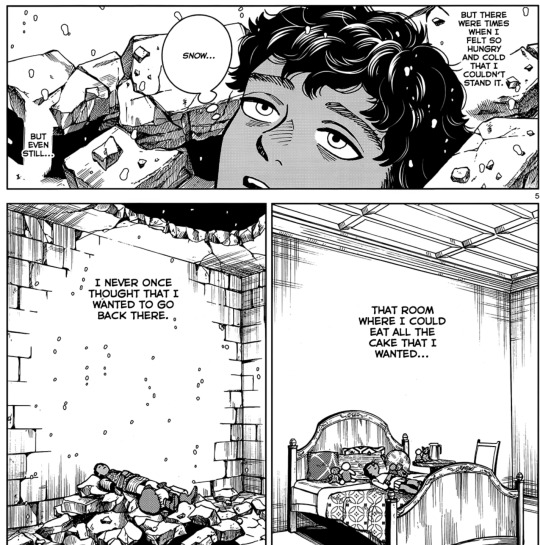
and Mithrun
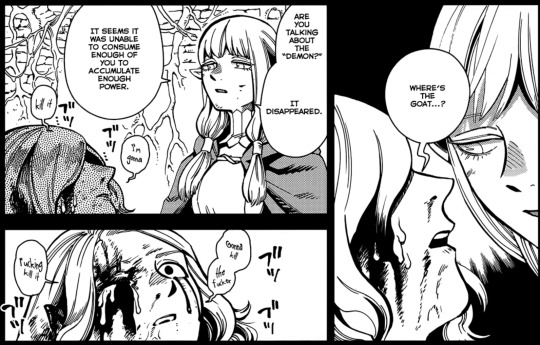
Hell, we even get it for the demon!

It's certainly not the only volume concerned with desires and motives, but it is particularly focused on these ideas.
The succubus scene fits quite well into the ongoing question about desires, especially Laios' desires. It is even placed at an interesting spot within the volume. The volume is six chapters long, and the scene takes place at the start of the 4th chapter. It's almost smack-dab in the middle.
With all this in mind, it is interesting that, with both versions of the succubus Marcille, it's not totally clear which parts of her Laios is rejecting.
The first version of Marcille looks human, but Laios attacks when he identifies her as a monster. The second Marcille looks like a monster, but he seems to believe that she is the real (human)(ish) person that he knows. So is he rejecting the monster at first, and then accepting the person? Or is he rejecting humanity and only interested in the monstrous?
Something to consider as we look at the next point...
3. the rest of the chapter is a seduction, too
This is one of those things that might not be apparent on a first reading, but is crystal clear on a revisit. We see the succubus try and charm Laios over 7 pages, and then see the Winged Lion do the same thing for the next 19.
Much like the succubus, it offers the mingling of monsters and humans. Much like the succubus, it offers belonging.

(and this is the point where I absolutely must also link this post by fumifooms on the succubus, which has some great ideas on how the scene is informed by Laios' trauma and desire for acceptance!!!)
But, back to the point. The Winged Lion wants to feed on Laios just as much as the succubus did, and it uses similar strategies to try and make that happen. Though this chapter isn't really the turning point for the next Lord of the Dungeon (it is Marcille who will, eventually, become the Lion's next victim), it certainly behaves like it is.
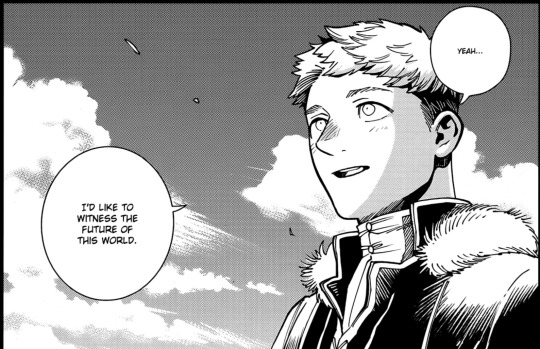
Laios is convinced. The succubus gets its meal. By the end of the volume, the reader begins to understand how concerning his desires are. Together, it is all very good at building up that sense of dread and pending disaster, as we see exactly how and why Laios might just fall into the Lion's open arms and bring about the end of the world.
-
So that's the three things I noticed. But there's still something I want to touch on by looking at the way these observations overlap, and what they reveal, together.
As I said, by the end of the volume, you can feel the tension growing. Just as Kabru and Mithrun do, you look back for an answer to the questions that have been built, chapter by chapter: why is Laios here? Where will his loyalties fall? This chapter, and scene, seem to prove the inevitable truth: he will choose the monster, of course. He will choose the seductive, easy power of the Winged Lion.
But the details of what actually happens tell different story: one in which the Lion is wrong.
First, as a reminder - even in Scylla Marcille mode, the succubus never fully entrances Laios. It convinces him, but it doesn't have him completely under its thrall.
Similarly, in the dream, the Lion does convince Laios to embrace the world he is offering. But even within that dream, Laios continues to ask questions that will be vital to him later. It is because of those questions that Laios comes to a new understanding about Thistle.

And it's this realization that he cites later as part of his reason for refusing the Lion's offer.
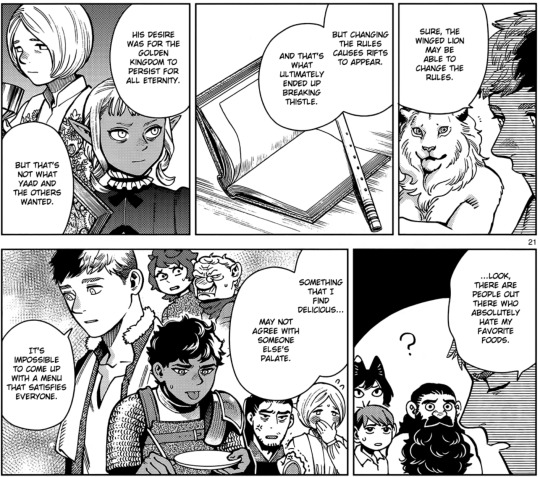
He is thinking through things the entire time, just like he continues to question the succubus even after it turns into Scylla Marcille.
Laios also expresses an interesting reason for why he wants to see the future of this world. He's not just invested because it would mean people liking what he likes, or him getting to spend time with monsters. The thought that comes immediately before his acceptance is about what he wants for monsters and people.
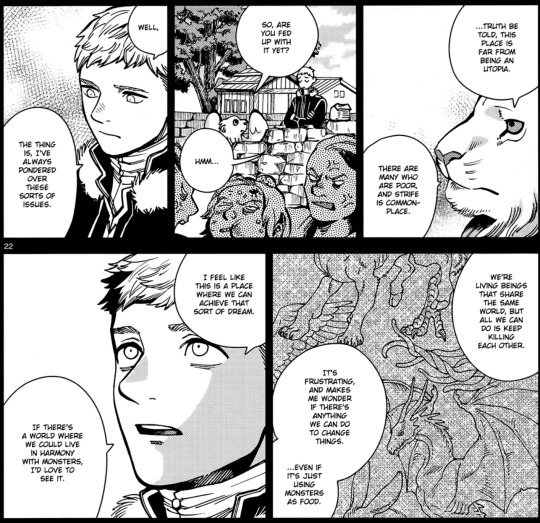
I don't think it's a coincidence that this statement - "we're living beings that share the same world, but all we can do is keep killing each other" - can apply to the various humans races just as much as it does to humans and monsters. The thing he is thinking about here isn't just a matter of his personal daydreams. It's an idea that underpins every conflict in the story.
Laios caring about how people as well as monsters in this manner is something that the Lion gets wrong every time. Even at the end, he still frames Laios' desires entirely around hating people and loving monsters.
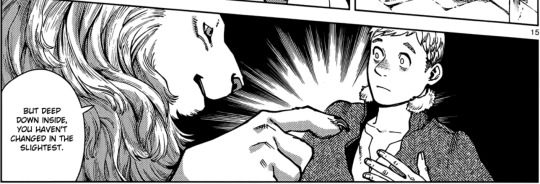
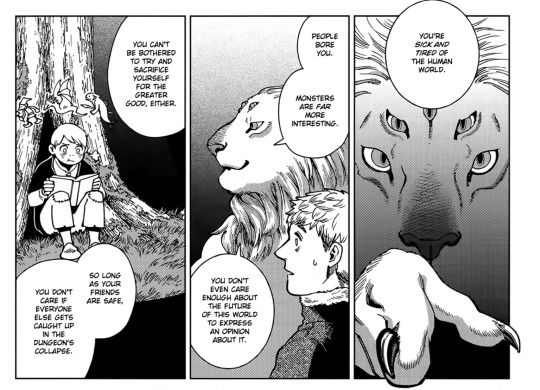
The Lion has heard him express an opinion about the future of the world! It happened right there in the dream, right in front of him! He just didn't take it seriously, and didn't view it through any lens other than "Laios likes monsters more".
He's convinced that he understands how to get to Laios. Maybe the Lion can't truly see everything, or maybe his vision into everyone's deepest desires has made it hard for him to realize how much choice still matters. That people can, and do, choose which desires to act on, and how to act on them.
Whatever the case, he's wrong about Laios, and the story shows us this over and over again.
After all, look at how the succubus interaction plays out:
A monster uses Marcille to appeal to Laios...
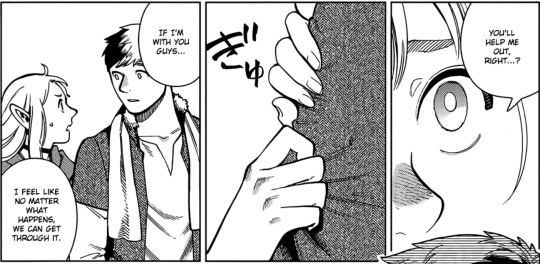
He realizes that something about the situation is wrong, and rejects her.
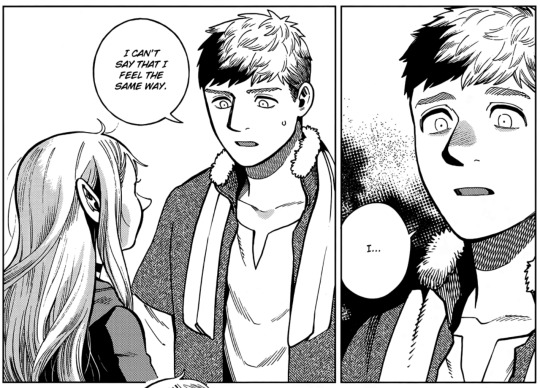
It changes strategies, and makes new offer: to turn him into a monster.
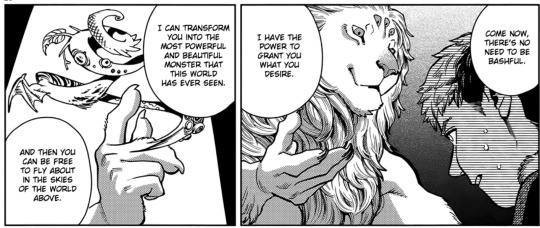
It also assures him that his friends are, or will be, taken care of.
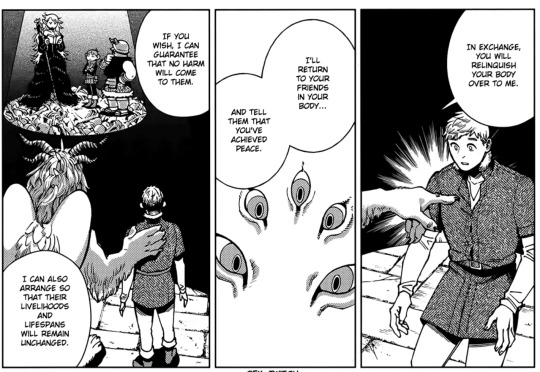
He accepts. Or rather, allows the monster to have its way with him.

But Laios is not as helpless as he initially appears, and what the Lion thinks is a successful seduction also contains the seed of an idea that will allow Laios to later resist him.

We even get to see Izutsumi playing a similar role in both instances, as the one person fully able to take action in the face to the illusion.

The story lays out what is going happen, and then explicitly tells us that the demon and the succubus are thematically related.
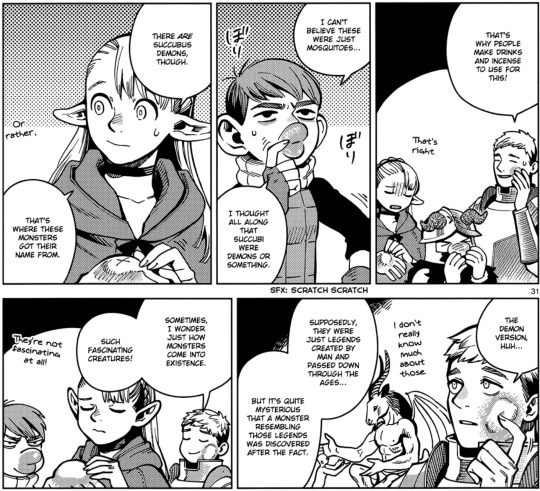
The chapter performs a great sleight of hand here - everything about it seems to indicate that Laios is doomed give in to the option to have his deepest desires realized. But if you look closer, it also contains the evidence that he won't. There's a lot more going on for him.
Yes, he still falls for obvious tricks. He is still extremely into monsters, and he still doesn't feel like he fits in with other people. He may, deep down, crave to surrender to the monstrous - to let it absorb him. But he questions more than he seems to. He considers more than people realize. He cares so much more than anyone gives him credit for.
And I think this is part of why we see the succubus called back to so many times, especially with the wolf head addition to his Monster Form, which he specifically added due to his encounter with the Scylla Marcille.
This all stays with Laios. It doesn't just foreshadow the path of the story, it is fundamental to how and why he walks that path. It's not about him choosing monsters, and it's not about him choosing people. It's about how he considers both, and cares about both.
And it's about the forces that think they already know his answer. Mithrun and Kabru. The Winged Lion. The succubus.
It's about how they are wrong.
#dungeon meshi#delicious in dungeon#dungeon meshi spoilers#laios touden#winged lion#dunmeshi analysis
9K notes
·
View notes
Text
I think this misses the point of why people consistently point out to stick to the list of BDS targets & disrespectful of their years of successful activism and the exact reason WHY it's a targetted boycott rather than a large sweeping list. A boycott is a political and economic strategy (and the economic boycott isn't the only thing the BDS does! Check out bdsmovement.net for their other campaigns!)

The reason people consistently call back to this list is because it's one made by an international activist group. Boycotts organized on twitter may feel like they have a huge impact because they got a couple thousand retweets but that number is barely a drop in the bucket. It also imo moves attention away from some of the more important targets of the BDS economic boycott like Israeli produce.
Starbucks is a special case because their boycott was called independently by Starbucks Union (and was iirc was in the planning stages already but the schedule on it got accelerated).
People aren't pointing to this list because they are "cowards" or "pathetic losers" they do so because to reach our political goals and create a force with actual economic pressure it's very obviously for the best to do so organized through unions or groups like BDS. I will confidently say most people rallying behind this boycott are also refusing support for companies like Disney and Amazon but they are pressure and not boycott targets for a very specific reason, namely that they are essentially monopolies that can be hard to avoid. Targetted campaigns do exist for them as well but they more often concern specific products (e.g. the next captain america movie for having a character in it that represents apartheid israel),
I HEAVILY recommend reading the BDS site [link here] to understand why people are doing their best to call attention to it specifically.
I agree that we should collectively do our best to focus our attention as consumers on doing the best we can to minimize harm but the reality is that under capitalism and colonialism the impact of any boycott is going to be limited. Organizing through larger groups like BDS doesn't just point our attention to international campaigns it can also serve as a way to organize locally for protests and direct action.
i honestly think people who are hellbent on people only sticking to boycotting 6 companies are pathetic losers and just feel threatened at the idea of having to stop eating mcdonald's and drinking starbucks. they want to justify their right to never challenge their relationship with consumerism without having to say it outloud.
they never shut up about how it's "impossible to boycott every company that supports Israel just stick to the BDS list", you don't want to cancel your Disney plus subscription nor do you want to stop eating pringles or drinking coca cola so you're going to portray those who want to boycott the 6 companies and more as people destroying the meaning of the cause


tweet 1: "CAN Y'ALL STOP SPREADING THESE LONG ASS LISTS OF ALL THESE COMPANIES IT LITERALLY DOES NOT HELP. PLEASE FOR THE LOVE OF GOD LISTEN TO THE BDS AND DO WHAT THEY SAY."
tweet 2: "yall are failing this boycott thing badly I'm not sorry. the BDS gave us a small followable list that shows companies that are 100% possible to boycott and then yall started adding brands that either create very essential needs or are literally impossible to boycott"
like I can assure you, there will always be brands that do not support Israel and are producing the same essential needs you need. the same thing goes for electronics, you can buy electronics second hand without having to continue to fund the exploitation of those in DR Congo....
#like the reality is quite frankly that this boycott is likely not going to stop the ongoing genocide of palestinians#bds has local groups literally worldwide and that is likely to include whichever city you live in or the nearest bigger one#and the economic boycott is far from the only thing they promote#i dont disagree with the points on choosing to do more than what they ask you to boycott#i disagree with the reason why people call back to it. and its frankly quite insulting to the year-long activism of those involved in bds#another thing is that their list is well-researched and backed by very specific goals and reasons#i know a couple days back smth was going around about krispy kreme being owned by zionists and how you should boycott them#which turned out to be years-old misinfo.#edit: not all of this is directed at op specifically i just feel like it needs to be said when posts like this spread w/o context#idk get fucking involved. blow up elbit systems.
183 notes
·
View notes
Text
Last spring my neighbour asked if I could let Pirlouit mow the grass around his barn from time to time, which Pirou was happy to do at first but if I left him there several days in a row he got pretty sad about being alone (lots of wistful, melancholy braying). So this year when my donkey was hired for this job again, I went for a different formula: for the past few weeks I've been bringing all the animals to the neighbour's barn for an hour of landscaping services now and then at apéritif time.

The fence is extremely not Pampe-proof so I have to have my apéritif while sitting on the road in a strategic position from which I can toss a stick in her direction if she tries to escape, but other than that I've been really enjoying this peaceful evening ritual, just sitting there reading and watching the animals while feeling like I'm doing my neighbour a favour. Pirlouit doesn't get all the grass to himself anymore but I've learnt that he prefers to be rich in friends than in food.

You'll notice that Merricat is present in every photo, looking alert. She too has been hired, but for the thankless job of Thought Police. She may look like she's just napping on the warm asphalt with not a care in the world...

... but she is working! Keeping an eye on the llamas, always.

I've discovered that in a specific context my three cats can act as precogs and warn me of Pampe's future crimes. My theory is that they developed this skill because of Poldine, who loves cats. Any cat who enters the pasture will soon be noticed and (lovingly) chased by Poldine, who wants kisses. Cats not only do not want llama kisses, they don't differentiate between individual llamas. They are all potential kissers. So even if it looks like she's all relaxed, Merricat is constantly monitoring where the llamas are and what they seem to be planning. If we are on the other side of a fence and Pampe approaches it a bit too slyly, Merricat will jump to her feet, ready to flee (and I will toss one of my anti-Pampe sticks, and say NON.)
Merricat and I are a very good team! We've foiled several of Pampe's plots, but we need to be on the road for Merricat to remain wary (if we were in the pen Pampe's escape attempts would involve getting away from us and the cat wouldn't care.) Cars are rare so it's okay (plus it's so quiet you can always hear them coming), and on the few occasions when someone showed up and asked why I was having apéritif on the road, I pointed at Pampe and they were like, "Ah! Didn't see her here. Good luck!"
"Hedgehog-moss, you're exaggerating. Pampe can't be that—"

She is! She is. And she always seems to notice when Merricat is on a bathroom break and I'm absorbed in a book.

There was one evening though, when she got distracted by a fascinating new idea. I don't claim to know what's going on in this llama's head (except when she's looking at a fence, then it's easy) but as you can see, once I brought the animals to the barn Poldine started eating flowers, Pirlouit started eating grass, and Pampe started eating the wall.


After a moment she slowly circled the barn, then stopped and lay down right next to it, settling down in a comfortable position but with focused ears and her head still turned towards the wall. It was suspicious behaviour, but on the other hand she now looked so uninterested in the road that I decided to take a risk and run home to bring back some dinner—and she didn't move while I was away! I even brought Pandolf, who is usually banned from these soirées because he would disturb my Merricat alarm system. He was happy to be finally included.

It's unclear if Pampe was eating the wall, talking to the wall, or carefully examining various parts of the wall as Step 1 of 27 of a complex plan only she understands, but she stuck close to the barn all evening instead of lying in wait by the fence so I was able to have a picnic in the grass rather than on the road, which felt more bucolic. I know that "Pampérigouste has a new, mysterious project" is a worrying sentence but at this early stage (feasibility study) it felt to me and Merricat like a little holiday!
#crawling along#if you look at the Pampe & The Wall photos you can see the adorable little goatee i gave poldine when i sheared her <3#it suits her she looks very elegant
4K notes
·
View notes
Text
The truth about Medusa and her rape... Mythology breakdown time!
With the recent release of the Percy Jackson television series, Tumblr is bursting with mythological posts, and the apparition of Medusa the Gorgon has been the object of numerous talks throughout this website… Including more and more spreading of misinformation, and more debates about what is the “true” version of Medusa’s backstory.
Already let us make that clear: the idea that Medusa was actually “blessed” or “gifted” by Athena her petrifying gaze/snake-hair curse is to my knowledge not at all part of the Antique world. I still do not know exactly where this comes from, but I am aware of no Greek or Roman texts that talked about this – so it seems definitively a modern invention. After all, the figure of Medusa and her entire myth has been taken part, reinterpreted and modified by numerous modern women, feminist activist, feminist movements or artists engaged in the topic of women’s life and social conditions – most notably Medusa becoming the “symbol of raped women’ wrath and fury”. It is an interesting reading and a fascinating update of the ancient texts, and it is a worthy take on its own time and context – but today we are not talking about the posterity, reinvention and continuity of Medusa as a myth and a symbol. I want to clarify some points about the ACTUAL myth or legend of Medusa – the original tale, as told by the Greeks and then by the Romans.
Most specifically the question: Was Medusa raped?
Step 1: Yes, but no.
The backstory of Medusa you will find very often today, ranging from mythology manuals (vulgarization manuals of course) to Youtube videos, goes as such: Medusa was a priestess of Athena who got raped by Poseidon while in Athena’s temple, and as a result of this, Athena punished Medusa by turning her into the monstrous Gorgon.
Some will go even further claiming Athena’s “curse” wasn’t a punishment but a “gift” or blessing – and again, I don’t know where this comes from and nobody seems to be able to give me any reliable source for that, so… Let’s put this out of there.
Now this backstory – famous and popular enough to get into Riodan’s book series for example – is partially true. There are some elements here very wrong – and by wrong I do mean wrong.
The story of Medusa being raped and turned into a monster due to being raped does indeed exist, and it is the most famous and widespread of all the Medusa stories, the one people remembered for the longest time and wrote and illustrated the most about. Hence why Medusa became in the 20th century this very important cultural symbol tied to rape and the abuse of women and victim-blaming. HOWEVER – the origin of this story is Ovid’s Metamorphoses, from the first century CE or so. Ovid? A Roman poet writing for Roman people. “Metamorphoses”? One of the two fundamental works of Roman literature and one of the two main texts of Roman mythology, alongside Virgil’s Aeneid. This is a purely Roman story belonging to the Roman culture – and not the Greek one. The story of Medusa’s rape does not have Greek precedents to my knowledge, Ovid introduced the element of rape – which is no surprise given Ovid turned half of the romances of Greek mythology into rapes. Note that, on top of all this, Ovid wasn’t even writing for religious purposes, nor was his text an actual mythological effort – he wrote it with pure literary intentions at heart. It is just a piece of poetry and literature taking inspiration from the legends of the Greek world, not some sort of sacred text.
Second big point: The legend I summarized above? It isn’t even the story Ovid wrote, since there are a lot of elements that do not come from Ovid’s retelling of the story (book fourth of the Metamorphoses). For example Ovid never said Medusa was a priestess of Athena – all he said was that she was raped in the temple of Athena. I shouldn’t even be writing Athena since again, this is a Roman text: we are speaking of Minerva here, and of Neptune, not of Athena or Poseidon. Similarly, Minerva’s curse did not involve the petrifying gaze – rather all Ovid wrote about was that Minerva turned Medusa’s hair into snakes, to “punish” her because her hair were very beautiful, and it was what made her have many suitors (none of which she wanted to marry apparently), and it is also implied it is what made Neptune fall in love (or rather fall in lust) with her. I guess it is from this detail that the reading of “Athena’s curse was a gift” comes from – even though this story also clearly does victim-blaming of rape here.
But what is very fascinating is that… we are not definitively sure Neptune raped Medusa in Ovid’s retelling. For sure, the terms used by Ovid in his fourth book of Metamorphoses are clear: this was an action of violating, sexually assaulting, of soiling and corrupting, we are talking about rape. But Ovid refers several other times to Medusa in his other books, sometimes adding details the fourth-book stories does not have (the sixth book for examples evokes how Neptune turned into a bird to seduce Medusa, which is completely absent from the fourth book’s retelling of Medusa’ curse). And in all those other mentions, the terms to designate the relationship between Medusa and Neptune are more ambiguous, evoking seduction and romance rather than physical or sexual assault. (It does not help that Ovid has an habit of constantly confusing consensual and non-consensual sex in his poems, meaning that a rape in one book can turn into a romance in another, or reversal)
But the latter fact makes more sense when you recall that the rape element was invented and added by Ovid. Before, yes Poseidon and Medusa loved each other, but it was a pure romance, or at least a consensual one-night. Heck, if we go back to the oldest records of the love between Poseidon and Medusa, back in Hesiod’s Theogony, we have descriptions of the two of them laying together in a beautiful, flowery meadow – a stereotypical scene of pastoral romances – with no mention of any brutality or violence of any sort. As a result, it makes sense the original “romantic” story would still “leak” or cast a shadow over Ovid’s reinvented and slightly-confused tale.
Step 2: So… no rape?
Well, if we go by Greek texts, no, apparently Medusa was not raped in Greek mythology, and only became a rape victim through Ovid.
The Ancient Greek texts all record Poseidon and Medusa sleeping with each other and having children, but no mention of rape. And the whole “curse of Athena” thing is not present in the oldest records – no temple of Athena soiling, no angry Athena cursing a poor girl… “No curse?” you say “But then how did Medusa got turned into a Gorgon”? Answer: she did not. She was born like that.
As I said before, the oldest record of Medusa’s romance but also of her family comes from Hesiod’s Theogony (Hesiod being one of the two “founding authors” of Greek mythology, alongside Homer – Homer did wrote several times about Medusa, but only as a disembodied head and as a monster already dead, so we don’t have any information about her life). And what do we learn? That Medusa is part of a set of three sisters known as the Gorgons – because oh yes, Ovid did not mention Medusa’s sister now did he? How did Medusa’s sisters ALSO got snake-hair or petrifying-gaze if only Medusa was cursed for sleeping with Neptune? Ovid does not give us any answer because again, it is an “adaptational plot hole”, and the people that try to adapt Ovid’s story have to deal with the slight problem of Stheno and Euryale needing to share their sister’s curse despite seemingly not being involved in the whole Neptune business. Anyway, back to the Greek text.
So, you have those three Gorgon sisters, and Medusa is said to be mortal while her sisters are not. Why is it such a big deal? Because Medusa wasn’t originally some random human or priestess. Oh no! Who were the Gorgons’ parents? Phorcys and Keto/Ceto, aka two sea-gods. Not just two sea-gods – two sea-gods of the ancient, primordial generation of sea-gods, the one that predated Poseidon, and that were cousins to the Titans, the sea-gods born of Gaia mating with Pontos.
So the Gorgons were “divine” of nature – and this is why Medusa being a mortal was considered to be a MASSIVE problem and handicap for her, an abnormal thing for the daughter of two deities. But let’s dig a bit further… Who were Phorcys and Ceto? Long story short: in Greek mythology, they were considered to be sea-equivalents of Typhon and Gaia. They were the parents of many monsters and many sea-horrors: Keto/Ceto herself had her name attributed and equated with any very large creature (like whales) or any terrifying monster (like dragons) from the sea. The Gorgons themselves was a trio of monsters, but their sisters, that directly act as their double in the myth of Perseus? The Graiai – the monstrous trio of old women sharing one eye and one tooth. Hesiod also drops the fact that Ladon (the dragon that guarded the golden apples of the Hesperids), and Echidna (the snake-woman that mated with Typhon and became known as the “mother of monsters”) were also children of Phorcys and Ceto, while other authors will add other monster-related characters such as Scylla (of Charybdis and Scylla fame), the sirens, or Thoosa (the mother of Polyphemus the cyclop). Medusa herself is technically a “mother of monsters” since she birthed both Pegasus the flying horse and Chrysaor, a giant. So here is something very important to get: Medusa, and the Gorgons, were part of a family of monsters. Couple that with the absence of any mention of curses in these ancient texts, and everything is clear.
Originally Medusa was not a woman cursed to become a monster: she was born a monster, part of a group of monster siblings, birthed by monster-creating deities, and she belonged to the world of the “primordial abominations from the sea”, and the pre-Olympian threats, the remnants of the primordial chaos. It is no surprise that the Gorgons were said to live at the edge of the very known world, in the last patch of land before the end of the universe – in the most inhuman, primitive and liminal area possible. They were full-on monsters!
Now you might ask why Poseidon would sleep with a horrible monster, especially when you recall that the Greeks loved to depict the Gorgons as truly bizarre and grotesque. It wasn’t just snake-hair and petrifying gaze: they had boar tusks, and metallic claws, and bloated eyes, and a long tongue that constantly hanged down their bearded chin, and very large heads – some very old depictions even show her with a female centaur body! In fact, the ancient texts imply that it wasn’t so much the Gorgon’s gaze or eyes that had the power to turn people into stone – but that rather the Gorgon was just so hideous and so terrifying to look at people froze in terror – and then literally turned into stone out of fear and disgust. We are talking Lovecraftian level of eldritch horror here. So why would Poseidon, an Olympian god, sleep with one of these horrors? Well… If you know your Poseidon it wouldn’t surprise you too much because Poseidon had a thing for monsters. As a sort of “dark double” of Zeus, whereas Zeus fell in love with beautiful princesses and noble queens and birthed great gods and brave heroes, Poseidon was more about getting freaky with all sorts of unusual and bizarre goddesses, and giving birth to bandits and monsters. A good chunk of the villains of Greek mythology were born out of Poseidon’s loins: Polyphemus, Antaios, Orion, Charybdis, the Aloads… And even his most benevolent offspring has freaky stuff about it – Proteus the shapeshifter or Triton half-man half-fish… So yes, Poseidon sleeping with an abominable Gorgon is not so much out of character.
Step 3: The missing link
Now that we established what Medusa started out as, and what she ended up as… We need to evoke the evolution from point Hesiod to point Ovid, because while people summarized the Medusa debate as “Sea-born monster VS raped and punished woman”, there is a third element needed to understand this whole situation…
Yes Ovid did invent the rape. But he did not invent the idea that Medusa had been cursed by Athena.
The “gorgoneion” – the visual and artistic motif of the Gorgon’s head – was, as I said, a grotesque and monstrous face used to invoke fright into the enemies or to repel any vile influence or wicked spirit by the principle of “What’s the best way to repel bad stuff? Badder stuff”. Your Gorgon was your gargoyle, with all the hideous traits I described before – represented in front (unlike all the other side-portraits of gods and heroes), with the face being very large and flat, a big tongue out of a tusked-mouth, snake-hair, bulging crazy eyes, sometimes a beard or scales… Pure monster. But then… from the fifth century BCE to the second century BCE we see a slow evolution of the “gorgoneion” in art. Slowly the grotesque elements disappear, and the Gorgon’s face becomes… a regular, human face. Even more: it even becomes a pretty woman’s face! But with snakes instead of hair. As such, the idea that Medusa was a gorgeous woman who just had snakes and cursed-eyes DOES come from Ancient Greece – and existed well before Ovid wrote his rape story.
But what was the reason behind this change?
Well, we have to look at the Roman era again. Ovid’s tale of Medusa being cursed for her rape at the hands of Neptune had to rival with another record collected by a Greek author Apollodorus, or Pseudo-Apollodorus, in his Bibliotheca. In this collection of Greek myths, Apollodorus writes that indeed, Medusa was cursed by Athena to have her beautiful hair that seduced everybody be turned into snakes… But it wasn’t because of any rape or forbidden romance, no. It was just because Medusa was a very vain woman who liked to brag about her beauty and hair – and had the foolish idea of saying her hair looked better than Athena’s. (If you recall tales such as Arachne’s or the Judgement of Paris, you will know that despite Athena being wise and clever, one of her main flaws is her vanity).
“Wait a minute,” you are going to tell me, “The Bibliotheca was created in the second century CE! Well after Greece became part of the Roman Empire, and after Ovid’s Metamorphoses became a huge success! It isn’t a true Greek myth, it is just Ovid’s tale being projected here…” And people did agree for a time… Until it was discovered, in the scholias placed around the texts of Apollonios of Rhodes, that an author of the fifth century BCE named Pherecyde HAD recorded in his time a version of Medusa’s legend where she had been cursed into becoming an ugly monster as punishment for her vanity. We apparently do not have the original text of Pherecyde, but the many scholias referring to this lost piece are very clear about this. This means that the story that Apollodorus recorded isn’t a “novelty”, but rather the latest record of an older tradition going back to the fifth century BCE… THE SAME CENTURY THAT THE GORGONEION STARTED LOSING THEIR GROTESQUE, and that the face of Medusa started becoming more human in art.
[EDIT: I also forgot to add that this evolution of Medusa is also proved by strange literary elements, such as Pindar's mention in a poem of his (around 490 BCE) of "fair-cheeked Medusa". A description which seems strange given how Medusa used to be depicted as the epitome of ugliness... But that makes sense if the "cursed beauty" version of the myth had been going around at the time!]
And thus it is all connected and explained. Ovid did invent the rape yes – but he did not invent the idea of Athena cursing Medusa. It pre-existed as the most “recent” and dominating legend in Ancient Greece, having overshadowed by Ovid’s time the oldest Hesiodic records of Medusa being born a monster. So what Ovid did wasn’t completely create a new story out of nowhere, but twist the Greek traditions of Athena cursing Medusa and Medusa having a relationship with Poseidon, so that the two legends would form one and same story. And this explains in retrospect why Ovid focuses so much on describing Medusa’s beautiful hair, and why Ovid’s Minerva would think turning her hair into snake would be a “punishment fit for the crime”: these are leftovers of the Greek tale where Medusa was punished for her boasting and her vanity.
CONCLUSION
Here is the simplified chronology of how Medusa’s evolution went.
A) Primitive Greek myths, Hesiodic tradition: Born a monster out of a family of sea-monsters and monstrous immortals. Is a grotesque, gargoylesque, eldritch abomination. Athena has only an indirect conflict with her, due to being Perseus’ “fairy godmother”. Has a lovely romance with Poseidon.
B) Slow evolution throughout Classical Greece and further: Medusa becomes a beautiful, human-looking girl that was cursed to have snake for hair and petrifying eyes, instead of being a Lovecraftian horror people could not gaze upon. Her conflict with Athena becomes direct, as it is Athena that cursed her due to being offended by her vain boasting. Her punishment is for her vanity and arrogant comparison to the goddess.
C) Ovid comes in: Medusa’s romance with Poseidon becomes a rape, and she is now punished for having been raped inside Athena’s temple.
[As a final note, I want to insist upon the fact that the story of Medusa being raped is not less "worthy" than any other version of the myth. Due to its enormous popularity, how it shaped the figure of Medusa throughout the centuries, and how it still survives today and echoes current-day problems, to try to deny the valid place of this story in the world of myths and legends would be foolish. HOWEVER it is important to place back things in their context, to recognize that it is not the ONLY tale of Medusa, that it was NOT part of Greek mythology, but rather of Roman legends - and let us all always remember this time Poseidon slept with a Lovecraftian horror because my guy is kinky.]
EDIT:
For illustration, I will place here visuals showing how the Ancient art evolved alongside Medusa's story.
Before the 5th century BCE: Medusa is a full-on monster



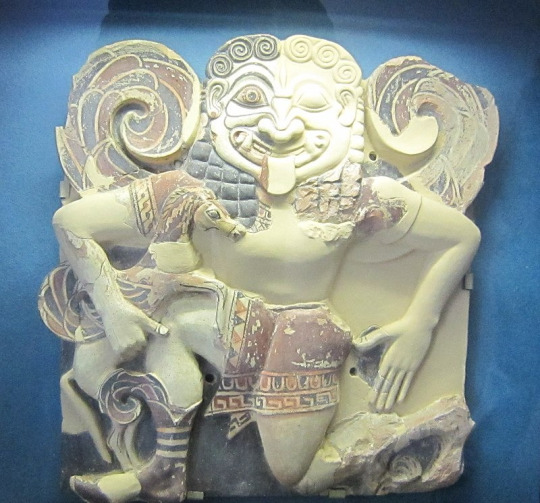


From the 5th century to the 2nd century BCE: A slow evolution as Medusa goes from a full-on monster to a human turned into a monster. As a result the two depictions of the grotesque and beautiful gorgoneion coexist.
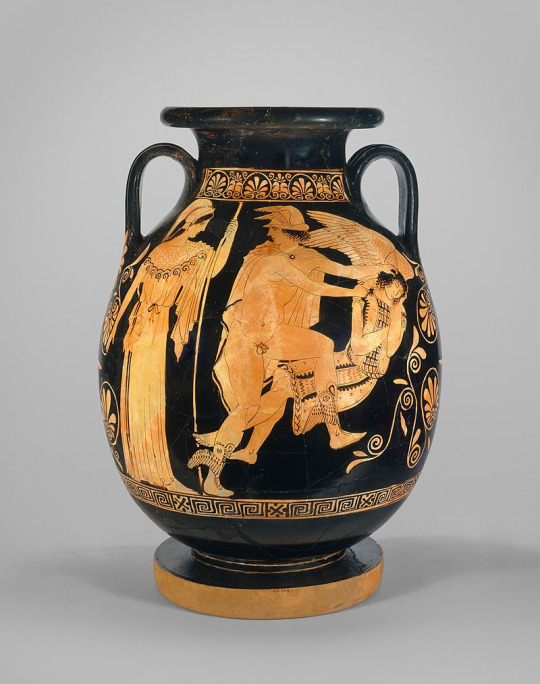


Post 2nd century BCE: Medusa is now a human with snake hair, and just that


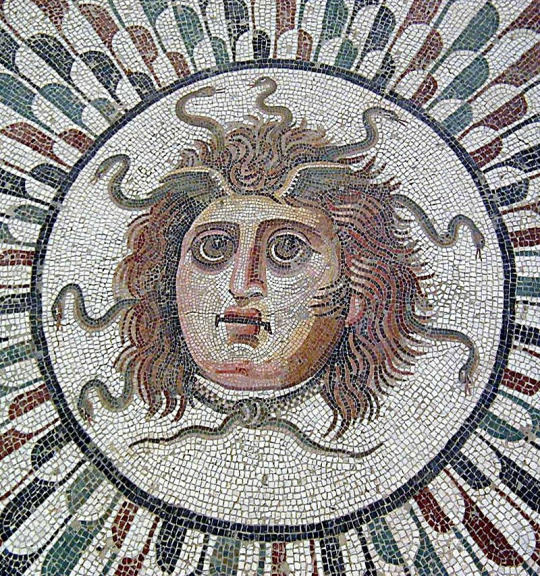
#greek mythology#medusa#gorgon#athena#gorgons#poseidon#neptune#minerva#ovid#rape in mythology#greek monsters#roman mythology
4K notes
·
View notes
Note
why exactly do you dislike generative art so much? i know its been misused by some folks, but like, why blame a tool because it gets used by shitty people? Why not just... blame the people who are shitty? I mean this in genuinely good faith, you seem like a pretty nice guy normally, but i guess it just makes me confused how... severe? your reactions are sometimes to it. There's a lot of nuance to conversation about it, and by folks a lot smarter than I (I suggest checking out the Are We Art Yet or "AWAY" group! They've got a lot on their page about the ethical use of Image generation software by individuals, and it really helped explain some things I was confused about). I know on my end, it made me think about why I personally was so reactive about Who was allowed to make art and How/Why. Again, all this in good faith, and I'm not asking you to like, Explain yourself or anything- If you just read this and decide to delete it instead of answering, all good! I just hope maybe you'll look into *why* some people advocate for generative software as strongly as they do, and listen to what they have to say about things -🦜

if Ai genuinely generated its own content I wouldn't have as much of a problem with it, however what Ai currently does is scrape other people's art, collect it, and then build something based off of others stolen works without crediting them. It's like. stealing other peoples art, mashing it together, then saying "this is mine i can not only profit of it but i can use it to cut costs in other industries.
this is more evident by people not "making" art but instead using prompts. Its like going to McDonalds and saying "Burger. Big, Juicy, etc, etc" then instead of a worker making the burger it uses an algorithm to build a burger based off of several restaurant's recepies.
example

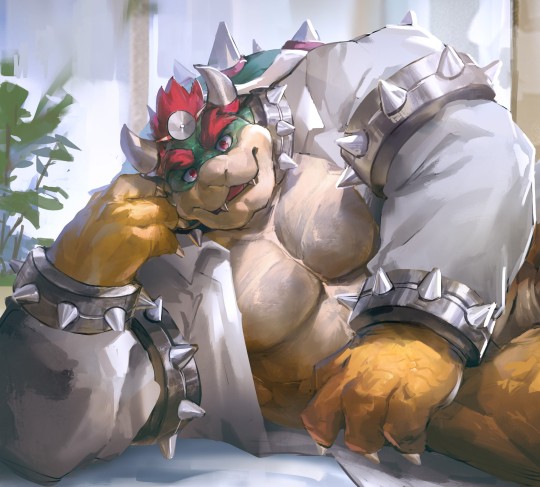
the left is AI art, the right is one of the artists (Lindong) who it pulled the art style from. it's literally mass producing someone's artstyle by taking their art then using an algorithm to rebuild it in any context. this is even more apparent when you see ai art also tries to recreate artists watermarks and generally blends them together making it unintelligible.
Aside from that theres a lot of other ethical problems with it including generating pretty awful content, including but not limited to cp. It also uses a lot of processing power and apparently water? I haven't caught up on the newer developements i've been depressed about it tbh
Then aside from those, studios are leaning towards Ai generation to replace having to pay people. I've seen professional voice actors complain on twitter that they haven't gotten as much work since ai voice generation started, artists are being cut down and replaced by ai art then having the remaining artists fix any errors in the ai art.
Even beyond those things are the potential for misinformation. Here's an experiment: Which of these two are ai generated?


ready?
These two are both entirely ai generated. I have no idea if they're real people, but in a few months you could ai generate a Biden sex scandal, you could generate politics in whatever situation you want, you can generate popular streamers nude, whatever. and worse yet is ai generated video is already being developed and it doesn't look bad.
I posted on this already but as of right now it only needs one clear frame of a body and it can generate motion. yeah there are issues but it's been like two years since ai development started being taken seriously and we've gotten to this point already. within another two years it'll be close to perfected. There was even tests done with tiktokers and it works. it just fucking works.
There is genuinely not one upside to ai art. at all. it's theft, it's harming peoples lives, its harming the environment, its cutting jobs back and hurting the economy, it's invading peoples privacy, its making pedophilia accessible, and more. it's a plague and there's no vaccine for it. And all because people don't want to take a year to learn anatomy.
5K notes
·
View notes
Text
It seems like a lot of the anti-transmasculinity/transandrophobia discourse revolves around the ideas that either this does not occur, does not occur in real life, or is just transmascs viewing criticisms of transmisogynistic transmascs as oppression, so here’s a story.
I live with some other people around my age, and I stopped using my deadname with them earlier this year. it hasn’t been that long, about 3 months, but generally, they use my correct name with an occasional mistake, usually followed up by a correction. one of them, however, just cannot seem to stop deadnaming me, often without correcting afterwards. when they do notice they’ve gotten it wrong, it’s usually followed up by a big thing about how they don’t know why they’re so bad at it or blaming it on being drunk if they’re drunk, but often not an apology.
an additional piece of this—my partner, who is a trans woman, changed the name they use around the same time, but this person almost always gets her name right. this person knows me a bit better/longer than they do her, but not that much better/longer, and generally, when I am around them, my partner is also there. (adding a cut here because this is gonna be long)
I talked with my therapist about this at my last session. I was seeking advice on how to handle it, but I also spent a lot of time just complaining and running through different incidences of this happening. I ended up telling her about some of the weird things this person said to me when I first started socially transitioning, including them saying that they were sad when I came out because they (direct quote) “didn’t want to stop seeing me as a genderless elf” (???!?) (I had previously identified as nonbinary and used any pronouns) and followed that up by saying that they hated men, which they then followed up by saying “not trans men though” (which like okay but then why bring that up in this conversation).
In talking my therapist, I circled back to the deadnaming issue and said that I thought this person was doing this to me and not my partner because my partner is more feminine than I am masculine (in social behavior and the way we look as two people that have not started medically transitioning). my therapist pushed back on this and said that, based on all the things I said, it seemed more like this person just didn’t want to see me as a man.
this blew my mind a little because I, a transmasculine person who spends way too much time on trans and transmasc internet, did not put the situation in this context while my therapist, a cis woman who is supportive but not super aware of the trans experience, did. it made a lot of sense though, and fit into the context of my other experiences and interactions with this person.
this person is a nonbinary person who has never identified as or been seen as a man. they are supportive of trans people generally and of their rights. they are also someone who believes that woman are inherently better than men. this generally doesn’t have much of an impact on the cis men we live with—for them, this more comes as being around for jokes that might make them a little uncomfortable, but doesn’t stop them from being seen as men. for me, this means I have to deal with the fact that this person doesn’t want to see me as a man and deadnames me accordingly, seemingly because they see me transitioning as a loss.
my point here is that when transmasculine people say that there are issues they face specifically related to them being transmasculine, that’s not a lie or a hypothetical. there is a stark contrast between the way this person treats my transfem partner and myself (and, after talking with someone who’s lived here with this person for longer, other transmasculine people who have lived in the house). they are supportive of trans people as a group, but not of transmasculinity, and I have to deal with the consequences.
1K notes
·
View notes
Text
a honorary thought about how theodore nott would be with you, mrs. nott, his wife— during those blessed first vacations as a married couple; your honeymoon.
warnings: includes smut, so obviously it's advised for +18 readers; read at your own risk. use of italian provided by google translator, if i have readers who speak italian fluently, please don't murder me! </3




honeymoon!theo who seems extremely relaxed, calm and unprepared for this first vacation with you as his wife, to italy— his home country. what you don't know is that theodore had been thinking and planning these weeks for months, maybe even years, during those mornings at hogwarts that he woke up before he needed to leave his bed and prepare for classes. unbeknownst to you, theodore is prepared to suggest names for your future children: that's how well theo has thought (and planned) for a future with you.
honeymoon!theo who doesn't give you much context or details over what you'll be doing during those weeks; you know that it'll be in italy, and got some advice over which clothes would be a good idea to bring in your luggage. if you expected one week of vacation— yeah, dolcezza, not happening. italy is a beautiful country; given the opportunity to show you around, theodore will make sure that his family's money is put to good use, and ensure at least three weeks of walking around.
honeymoon!theo who has most of the days planned; he made sure that three weeks was enough time to see part of italy's best spots, yet never giving you one day that makes you feel exhausted. at most, you'll see or visit three different places during the same day, yet not far enough that'll get your feet hurting from walking too much.
honeymoon!theo who had a hard time selecting where to take you during these three weeks— at the same time that he wants you to see how lively, colorful and amazing his homeland is, theodore doesn't want to have you exhausted in a matter of days. in the end, theo decided that he'd give you the best of two worlds: the beautiful cities, and the breathtaking countryside.
honeymoon!theo who makes sure that you'll have a taste of most of italy's native dishes. desserts, treats, appetizers, dinner and even drinks; theodore makes it a point to show you why he slandered hogwarts' food on a daily basis. however, if you're a picky eater or have a few food limitations, theo makes sure to only encourage you to eat what he knows that you'll like. never forces you to taste anything that you might not like, should it have any ingredient that you don't eat / don't like.
honeymoon!theo who will buy a slice of pizza, a cup of pasta or other treats as you stroll around the streets, making sure that you taste some of them and are never the slightest bit hungry.
honeymoon!theo who teached you a few sentences and phrases in italian, helping you with the pronounciation just right. simple things, really, like petnames, simple phrases (how to say thank you, how to say hello and good morning, even a few curse words should someone be a jerk to you and because you cursing on his native language turns him on).
honeymoon!theo who refers to you as mrs. nott. if you're at a restaurant— theodore will be a gentleman and make the order for the two of you, saying what he'd like to have, and what mrs. nott chose instead for today's meal. will teasingly refer to you as mrs. nott, if you ever engage playful banter or have a silly argument. if you're angry, well, being called mrs. nott dissolves any annoyance that you might have towards your husband.
honeymoon!theo who takes the chance of being in italy again, to buy his favorite brands of cigarettes; he promises to smoke a little less, though. one in the morning, as he waits for you to finish dressing up for the day— then one at night, leaving the windows open after you two were intimate, as you are comfortably laying on his chest. one hand holds the cigarette, while the other runs its fingers through your hair; here, theodore has each hand holding two of his biggest addictions. surely, if possible, theodore might sneak one cigarette during afternoon or after lunch; if you don't like the smell, theo will make sure to do it away from you. is there a shop you'd like to check? while you explore it, theo might smoke his second cigarette of the day.
honeymoon!theo who never gets his hands out of you. waist, lower back, holding hands or intertwined fingers; now that you're his, he has even less reasons to let go of you. italy is a crowded, famous country for vacations; between locals and tourists you walk together, as theodore guides you along, making sure that he never loses sight or hold of his wife.
honeymoon!theo that has a morning routine; lazying around in bed for a little longer, forearms feeling the softness of the pillow as he rests his head there— prompted up enough to see you. his gaze never wavers; theodore watches as you walk around the bedroom, each step being a soft pad on the floor, as you rummage through the wardrobe and seek for what you'll wear today; making your way then to the bathroom. if he's too sleepy, theo will take a light nap as he waits for you, lulled by the muffled sound of the water running for your shower; should he feel a bit more energetic, or more of a morning person, theo will follow you like a puppy, hugging your waist from behind as he kisses his way to shower with you.
honeymoon!theo who decides that his vocation is to help mrs. nott, his stunning, gorgeous wife getting ready for anything. oh, so you're preparing yourself to sleep? theodore will be more than happy to brush your hair, or to have you teaching him what products to apply, and how, to your hair— are you too lazy to take off your make-up? don't worry, theo does it for you; and even throws a dirty joke about removing your make-up in another, more elaborate and definitely much more pleasant, way. specially after a long day strolling around the streets, theodore will be more than happy to just let you relax, while he takes care of you.
honeymoon!theo who also loves to help you getting ready to leave, too. do you need this thing from the wardrobe or from your luggage? don't worry, he'll get it for you. are these the shoes you're wearing tonight? sit on the bed, bella, i'll tie them for you. do you need him to hold something or even help you with your hair? theodore nott is a very competent husband (or does his best to learn how to be very helpful for you). if you don't need help, well, theodore will sit on the edge of the bed, with those icy blue eyes gaining a new loving shade, as he looks at his bellissima getting ready to leave the room with him.
honeymoon!theo who took you to some window shopping with you, at venice and milan. two beautiful cities, where people proudly dress to impress; the shops didn't disappoint you at all. each dress or mannequin that you stared for more than two seconds got theodore to hold you by the hand, and gently dragging you to enter the shop; theo was more than happy to hold bags for you, one arm wrapped around your waist, while the other proudly holds his wife's bags from all the stuff you bought (correction: what theodore persuaded you to bring along, strictly using his family's money).
honeymoon!theo who perfected the art of convincing mrs. nott to agree with allowing him to spoil her; why shouldn't you be pampered by your own husband? in fact, theodore argues that doing so is a significant other's duty (and privilege). should you argue that everything's too expensive, well, theodore has two valid arguments for that: one, the nott family is ridiculously wealthy— one dress won't make his wallet lighter; and two, it's your money too, now. so why shouldn't you use it?
🗯️ : but teddy, darling— this is too much. i won't have enough space in my luggage to take all of these extra clothes with me.
t : don't worry about that, carina. if anything, we'll buy an extra luggage for you. fanculo, you know what? let's buy you a bigger one so you'll have to buy more things to fill it up. here, cara mia, look at this shop.
honeymoon!theo who takes a few nights to take you to dance around with him, strolling around some streets with good bars— a fancier version of those slytherin parties that you went together, except the lack of excessive green, besides lorenzo and mattheo's tendencies to start a brawl over flirting with an already taken girl. theodore dances with you, the two of you swaying with the rhythm, having the most fun, as you try to talk to each other sometimes or exchange a few comments here and there. if a younger guy has the audacity to look at you, theodore will glare at them in such an intimidating way, that the bloke doesn't even have to know about how theodore nott was a feared rival at hogwarts; should he be older, theodore will yell a clear threat in italian.
t : guarda ancora mia ragazza e ti garantisco che nessuno incontrerà i tuoi occhi dopo che li avrò cavati davanti a tutta la tua famiglia, stronzo del cazzo.
🗯️ : theo, what was that? what did you say? i didn't understand...
t : nothing, dolcezza; would you like a drink? here, let's go buy one together.
honeymoon!theo who translates anything and everything to you, specially if you ask him. if you're at a museum and would like to know what the description of some painting is, then theodore will explain or straight-out translate for you. don't worry, he's more than happy to do that— theo does it so patiently, that you would notice that he actually enjoys it. maybe he's returning the favor, for those few times that you've helped him pronounce a few words before class starts; maybe because theodore finds it heartwarming how you show such interest for his culture, and how endearing it is to see you trying to understand a few words here and there.
honeymoon!theo who separated these few days strolling around the city, walking around the streets and seeing a few attractions that he knew that you'd like (a few museums, for example); and got you to another city, one where he planned to have a more lighthearted routine. summer in italy is hot; to have you not enjoying the heat with one day or two to tan, to enjoy a pool or simply lazying around would be wrong; a waste, even. during those days, theodore made sure to let you rest on your chair, while massaging the sunscreen into your skin. those few days spent like that were fun; you didn't do much, but sometimes, doing nothing is the best.
honeymoon!theo who got to drink a few cocktails with you during those few days, sunglasses shielding your sights from the blazing sun, and swimsuits ready to have at least a swim together. conversation flows as easily between you as ever; taking a sip of your cocktail while the other talks, taking turns to share opinions or to continue the conversation. perhaps theodore took the chance to lightheartedly discuss what you'd do after these weeks— would you like to live with him to nott's estate, and leaving your shared cozy apartment for the time being?
honeymoon!theo who would only not shower with you if you two really had to get ready as fast as possible. otherwise, he's joining you; kissing your shoulders while you wash yourself, hugging your waist as he hums to whatever you're telling him. unless you'd rather wash your own hair or have a specific way of doing it, then theodore is more than happy to do it for you; as soon as he's done, he'll poke your nose with your shampoo's foam, signaling his concluded work. surely, theodore marvels at having you hugging him and washing his back at the same time— hey, where are you going? no, hug him for a little bit more; his back should be properly washed, you know?
honeymoon!theo who finds these weeks blissful. no quickies, no hurries; contrary to hogwarts, that even your own dorms weren't the most private places; or your daily life, where some of his friends are comfortable enough to visit without invitations— here at the hotel or alugada house you're at, there's privacy, time, and no restrictions for noise.
honeymoon!theo who takes his time with you. taking each piece of clothing with a calm movement, kissing every inch of skin in display; making sure that tomorrow morning, you'll have to complain or pout at him, due to those new bruises his lips will leave on your skin. neck and thighs are two favorites of his; however, there's something sinfully attractive and arousing about marking up your chest. a little dirty secret of his, one that only his eyes are allowed to see— besides yours, of course.
honeymoon!theo who gets a little insane in the head each. single. time that you have the audacity to speak italian to him, specially during these intimate moments. it doesn't matter if your pronounciation isn't perfect— even a single amore does things to him. whisper fanculo a me to his ear, and you might have to choose a more lighthearted agenda tomorrow, for the sake of your sore legs.
honeymoon!theo who becomes impossibly possessive. having been an overprotective boyfriend at times, making sure that each single student and their mothers knew that you're taken for life, these few weeks are feral. it becomes calmer as the days pass by, though; theodore takes some time to normalize the overwhelming reality that finally, finally you are his wife— mrs. nott.
so, honeymoon!theo who doesn't shut up. theodore needs to tell you how long he's waited for this, to have that ring on your finger; that same hand that he holds as he thrusts into you, or pleasures you in anyway— thumb tracing over the piece of jewelry exchanged on that day that you two got married. his fingers intertwine with yours, blue eyes bewitched by the sight of you under him, and even more intensely if you go on top. theodore nott is a shameless man; he'll only encourage you to moan louder for him, to tell him how good he makes you feel. theodore nott is so, so shameless, that he won't hold back any moan, any groan, anything he wants to say; this man will continue his rambling over how long he's dreamt about putting a ring on your finger, about being wed to you, about showing you his homeland— he'd say all of his in italian, though. if you're lucky, you'll catch up a few words; if not, well, theodore's voice sounds even better when he speaks his native language so fluently.
honeymoon!theo who doesn't have to hold back his baby fever anymore. will get you that final orgasm, with you sitting on his lap, his cock deep inside you, your back flushed against his warm chest; your hips feel those calloused, warm hands holding your hips down, making sure that the two of you can see the reflection of that mirror in front of the bed— one that theodore, shamelessly, requested to have it placed there. blue eyes lock their gaze there, where he disappears inside you, as you take him so well.
honeymoon!theo who doesn't shut up as he keeps you like this for a long moment, as praises leave his lips; 'you're stunning, cara mia, davvero bellissima— you'll look even prettier with our babies inside you.' as he speaks, theo presses kisses to your neck, one hand moving to rub circles on your clit; as if he wasn't already buried so deep inside you, pressing against that spot that has your legs shaking. theo doesn't let you stray much farther from his aching erection: 'brava ragazza, you'll take it all, won't you? we can't have a single drop leave your pretty little cunt.'
honeymoon!theo who secretly hopes that you'll come back to england with a baby in your womb; as much as he absolutely adores this life with you, on getting your full attention, falling into a domestic routine— theodore can't wait to see how your child would look like. theo can only pray that they inherite your lovely smile and beautiful hair, but keep his eyes. blue eyes, identical to the ones his mother, phoena nott, had. besides, if you do end up pregnant and keep the baby— next time that you go to italy, there would be a tiny human keeping you two company. theodore daydreams about that day.
⋯ ⋯ ﹒ 🪸 ’
౨ৎ calling out my name ♡ ͡
in the summer rain, ciao amore . . .

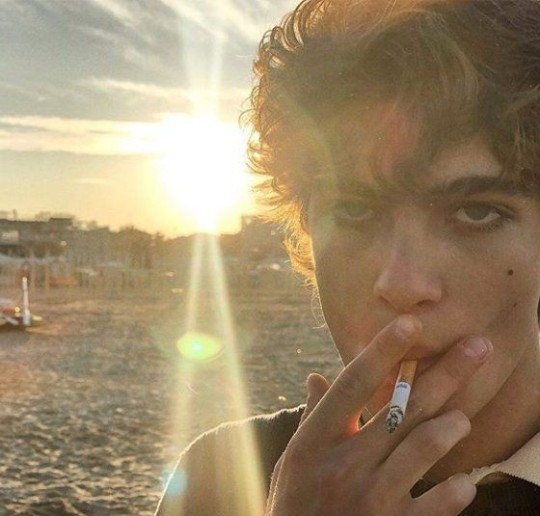



🪻 ; . . . fandom : harry potter.
— spreading the 'theodore nott being a loving husband and slightly obsessed with the love of his life' agenda; this boy had the first draft of how your honeymoon would be after your fifth date with him.
the headers + gifs + icons aren't mine. credits to the respective creators ! 🌷
#theodore nott#headcanons#slytherin boys#slytherin boys react#hp fandom#theodore nott x reader#hp fanfic#theo nott#harry potter#theodore nott x you#honeymoon#honeymoon headcanons#fluff#smut#theodore nott smut#theodore nott dating headcanons#theodore nott imagine#theodore nott dating#theodore nott headcanons
2K notes
·
View notes
Text
okay. let’s talk about jayce’s monologue, since people are calling him ableist.
for context, not that it matters: I have a significant mobility disability and a progressive chronic illness which, even when managed, can kill me. I’m not in exactly the same boat as viktor since my disease isn’t terminal, but I’ve had very similar experiences to him. this shapes my perception of him and of this storyline.
this is the monologue:
You’ve always wanted to cure what you thought were weaknesses. Your leg. Your disease. But you were never broken, Viktor. There’s beauty in imperfections. They made you what you are. An inseparable piece of everything I admired about you.
first, it should be noted that “what you thought were weaknesses” is not the same thing as “things that are good.” jayce is not saying that viktor’s disease is or was a good thing. what he is saying is that he admired (loved) everything that viktor was, which included the things viktor thought made him a burden or a problem. remember also that jayce almost doomed the world because he couldn’t let viktor die; he would never imply that viktor dying was a good thing.
the next question, then, is whether viktor sees himself as a burden or not. I think it’s implied that he does — it’s certainly not unrealistic to think that viktor might have come to view himself, or at least his disease, as a burden and a flaw. disabled people often view ourselves that way either because of internalized ableism or because society constantly tells us that we’re burdens and that our bodies are abnormal and wrong. viktor displays behaviors that indicate internalized ableism, including hiding the fact that he’s coughing up blood from jayce the first few times it happens and generally refusing to be in the public eye in a way that is self-effacing and not just him being private. yes, he says in act 1 of season 1 that he believes in himself, but he does also call himself a cripple in a dismissive way in that same scene; also, he doesn’t have the disease at that point. arguably the entire scene where he runs despite clearly being in pain is an example of his internalized ableism, but that’s another post.
more evidence for viktor’s perception of himself being negative is that he clearly has a sense that he doesn’t deserve to be loved (specifically by jayce, but maybe also in general). we see this when he asks jayce why he’s still persisting in saving him. we see this with his generally self-effacing behavior. we see this with the fact that in all of season 1, the only person he allows to touch him is jayce, and that the only person he actively touches in the entire show is jayce. viktor is reserved and not good with his emotions, which is a huge part of his arc this season. all of these behaviors point to him having a negative self-perception.
I think it’s important to really consider how jayce perceives viktor and how viktor perceives himself. I don’t think this season handled everything perfectly, but I think they handled this very well. viktor has been written with a fullness and complexity that most disabled characters don’t ever get. him being morally grey doesn’t mean he’s “problematic” or “bad representation.” obviously I’m only one disabled person, but I really love jayce and viktor and I think their story is beautifully written.
#arcane#arcane spoilers#jayvik#viktor arcane#jayce talis#whenever a new season of arcane comes out it spawns the most heinous discourse about ableism#I’m on chemo I don’t have the time for this. alas i care deeply about these animated pixels
905 notes
·
View notes
Text
Revolutionary Girl Utena: Gender in Context
beneath the cut, I discuss the RGU's portrayal of gender in the context of 1990s Japan.
in Ikuhara's interview with Mari Kotani, he stated that in traditional Japanese society, "prince" meant "patriarch." the same is true in Western societies--there was a time when a prince would be an heir to a royal line. by 1997, this meaning had died out of large parts of the world. even the association between princes and traditional masculinity was fading. Saionji, the weakest, most pathetic man in the show, is a parody of historical Japanese masculinity, with his kendo and his blatantly regressive beliefs about women.
in RGU, prince may still mean patriarch, but in a far more subtle fashion. Ikuhara and Kotani discussed the changing expectations for men in the latter half of the 20th century--it became gauche to fight over a woman with one's brawn, so instead, power struggles were played out in the arena of looks and sex appeal. one can see this reflected in the character Akio, whose power as a prince arises from his ability to turn "easy sensual pleasure based on dependency" "into a selling point with which to control people."
Akio has his moments of showboating masculinity, but when preying on Utena, he operates by making himself seem non-threatening and soft.
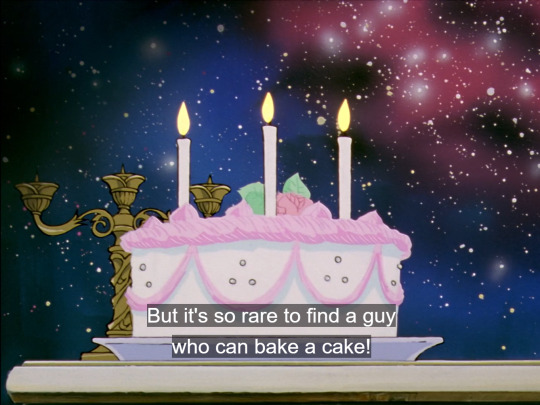
not only that, but he purports to want to allow students to express their individuality and thus approves of Utena's masculine form of dress. this is a front--by the end of the show, he's telling Utena that girls shouldn't wield swords. thus, through Akio's character, the show argues that traditionalist patriarchy in Japan isn't gone, but instead has only been papered over with false progressivism.
with all that said, there seems to be more to the character. he's taken the family name of his fiance, Kanae, and whatever material power he has in the school is dependent upon her family. in Japanese society, this is considered a humiliating position to be in, something that only a shameless man would do. the show never gives the audience any insight into how Akio feels about this--is he unbothered entirely, or are his actions against the Ohtori family an expression of his repressed anger? does he harm the children under his care to compensate for his humiliation?
this aspect of Akio's character may seem irrelevant in light of the larger, immaterial social forces at work in the show. however, I would argue that it was included for a reason. Akio, despite his status as ultimate patriarch of Ohtori, is in fact a highly emasculated character, to the point where lead writer Enokido even said that he is driven by an infantile mother complex.
to explain why Akio was portrayed this way, we have to discuss Japanese history. the nation suffered a major defeat in WWII and was forced to accept whatever terms the United States laid out for it. for an examination of how the Japanese have never truly processed those events and have plunged into modernity with reckless abandon, I recommend Satoshi Kon's Paranoia Agent. to sum it up briefly, in a very short period, the nation regained its economic footing, and by the 1980s had the largest gross national product in the world. this economic boom may have allowed Japan to maintain a sense of sovereignty, dignity, and power, but it was inherently fragile.
the infamous "bubble economy" lasted from 1986 to 1991. during this time, anything seemed possible; financial struggles appeared to be a thing of the past, and capitalist excess reached new heights. the ghosts of this period can be felt across Japanese media; for instance, think of the final shot of Grave of the Fireflies (1998), where the two dead children look down on Kobe, glowing an eerie green to imply its impermanence. the abandoned theme park from Spirited Away (2001) is explicitly referred to as a leftover from the previous century, when many attractions were built and then tossed aside in a few short years.
the bubble popped in 1992, leaving an entire generation feeling cheated. the bright futures they'd been promised, which had actually materialized for their parents and older siblings, had been lost to them overnight. economic crises are often accompanied by gender panics. to quote from Masculinities in Japan, "The recession brought with itself worsening employment conditions, undermining the system of lifelong employment and men’s status of breadwinners in general. The unemployment rate was rising, and although it never reached crisis levels, men could no longer feel safe in their salaryman status. Their situation was further complicated by the rising number of (married) women entering the workforce."
with this in mind, Akio's character can be taken as a representation of masculinity in crisis in 90s Japan. he's forced to rely on women for his position in life and has failed to save his only relative, Anthy. he tries to escape his misery through hedonism, perhaps an allegorical representation of how men tried to maintain their old standard of living after the economic bubble burst.
but of course, Akio is not the main character of RGU--the story is about girls. mangaka Yamada Reiji discussed the series in the context of the 90s, stating the following:
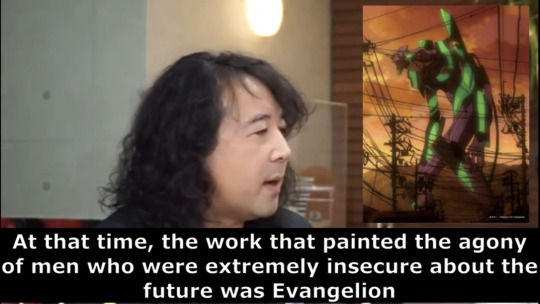

while I opened this essay by discussing the prince, the same points could be made about the princess. despite the increasing irrelevance of royalty, princess is still an important concept. how does it relate to the socioeconomic landscape of the 90s?
in Yamada's view, RGU is full of relics of the 80s; for instance, the figure of the ojou-sama, an entitled young woman who never lifts a finger for herself. during the economic bubble, it was increasingly common for women to be entirely taken care of by the men in their lives. Yamada names Nanami as a clear ojou-sama type character: she weaponizes her femininity, demanding to be rescued, doted on, and served.
however, by 1997, the ojou-sama could no longer expect to get what she wanted. from the 80s to the 90s, the percentage of women in the workforce increased around 15%; it was no longer viable for most women to be "kept" by their families. as the men experienced the humiliation of not being able to provide for their wives and children, women were undergoing a disillusionment of their own.
Yamada blames Disney for creating the ideological structure which led women astray. obviously, the company is known for its films about princes rescuing princesses. in Yamada's recounting, during the 80s, the company was infiltrating Japan through its theme parks as well; across the country, Disneylands were opening up, and people were buying into the escapism the corporation offered. Japan, as America, became a country of eternal children. its people were waiting for a prince to appear and save them.
but fairy tales can't stave off reality forever. Yamada claims that RGU embodies the rage of young women who woke up one day and realized that they had been raised on a lie. this anger pervades the work from beginning to end.
though RGU was created in a particular social context, its lessons can be extrapolated to any time and place. as the first ending tells us:
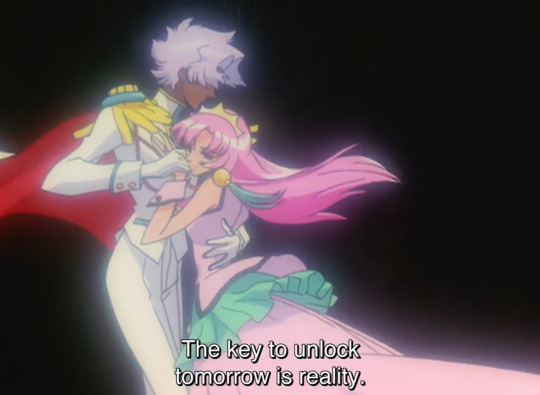
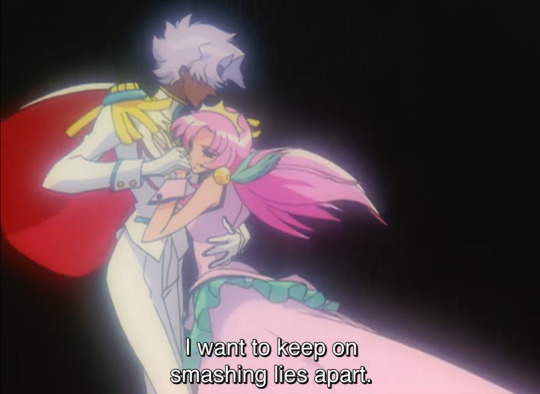
I hope this essay helped provide more context for the series. thanks for reading!
#rgu#commentary#revolutionary girl utena#this was originally a part of another essay but i revamped it and added a lot more detail
757 notes
·
View notes
Note
So many TTRPG people, like yourself, seem to exist in a world where players don't actually enjoy the campaigns they're in, and don't actually like playing with the people they play with, and your whole approach to game mechanics seems like it's about trying to bribe these people to continue playing at a given table.
i have no idea where you get this idea from, I play a bunch of different games - including freeform text rp, fest larps, parlour larps, regular tabletop campaigns, longform play-by-post games and narrative wargames - and I have a lot of fun doing it. I wouldn't be a game designer if I didn't actually enjoy games. The thing is, if you study game design and ttrpg theory seriously, you think about the intent behind design decisions. Game design doesn't just happen by accident, the designer put a given rule in for a reason. So, you ask yourself why the designer made the game the way it did, and what they were trying to achieve.
A significant tool for game design is considering the feedback the game provides; what behaviours that ruleset rewards and what it discourages. (You can apply this analysis to other games, too, like video games). When I'm talking about a bribe, it's in that context; how does the game reward you for doing things, and what things does it reward. (For example, 'scrabble' rewards you for playing words with weird letters in them by making those letters worth more points.)
The thing is, ultimately, every game relies on a simple proposition; that if you volunterily use its rules, you will have fun. You don't need to follow the rules, and you can have fun without them, but the idea is that using the rules will let you have more fun, or a different type of fun, than if you didn't. (For example, throwing a ball around is a bit fun, but if everybody agrees to follow the rules of basketball, you get a different experience that a lot of people prefer). So, the only bribe you're making on the interpersonal, out-out-of-game level (unless something weird is going on) is "if we play this game it will be fun". When I talk about bribes and incentives, it's *inside* the game, after we've all agreed to the game's proposition of "if you use the rules, you will have fun".
Now, what counts as an incentive varies by game. Some, like Warhammer 40k, are challenge-based, and have ways to keep score of success and victory; here, things that signify overcoming the challenge are your incentives; how you get a high score, how you win, etc. Others, like most ttrpgs, are creative-based. What constitutes an incentive within the game's structure is less precisely defined. By and large, though, these incentives tend to be things like increased agency within the game fiction, space for creative expression, and experiencing and learning about more of the game fiction. (In this structure, 'being more mechanically powerful' can be thought of as a way of granting a player more agency, because their actions are more likely to succeed and result in the outcomes that they want. If the mechanical growth is lateral as well as vertical, then how to get more powerful is - itself - a venue for creative expression in what to prioritise, which is also a reward).
In the same way that you have the adage that 'restrictions breed creativity', the same goes for Fun. Limiting your scope from anything-goes freeform by voluntarily agreeing to use a set of game rules can produce similar results. Voluntarily limiting your agency in the fiction according to a set of game rules produces a friction that players of roleplaying games find enjoyable to push against. In this context, a reward structure within a game serves the useful purpose of signposting which direction you should push to get the fun kind of friction. A game which limits your options, and then gives you more options when you engage with certain behaviours, is telling you that those are the intended behaviours. Likewise, a game that limits your options even further when you do something is encouraging you not to do that. This is because game designs are not neutral and universal, they exist to create specific experiences. A game that rewards you by giving you more space for creative expression when you get in a fight - and gives you less space for creative expression when you avoid violence - is one that wants you to engage in violence, because it's designed to be a game where you have fun by fighting. This isn't bribing the players to sit down at the table and play the game; that has already happened outside the context of the game. They have already agreed to the game's offer of 'if you use these rules, you will have fun'. Rather, this bribing is within the game-space, the games mechanics encouraging the players to engage with it as intended, in the way that will be most fun. IE: these incentive structures are a tool the game uses to achieve the promise it makes; they guide the players towards the fun that they volunteered to have. Hope that makes sense. * * * Now, your initial ask is a weird take that's entirely unrelated to anything I've posted, and - particularly from an anon account- oddly antagonistic. I don't know if you're genuinely confused about game design, or arguing in bad faith. Either way, this probably doesn't merit the small essay I've produced, but have one anyway, it's always fun to clarify my ideas in written form.
908 notes
·
View notes